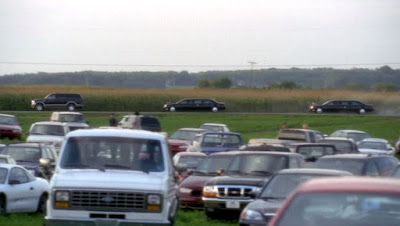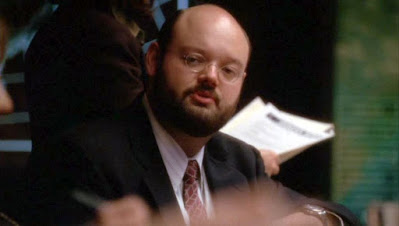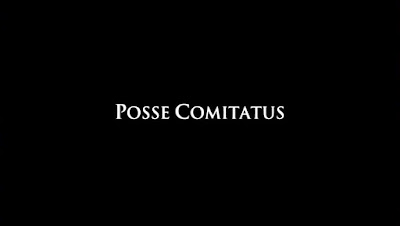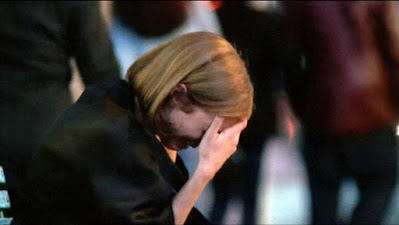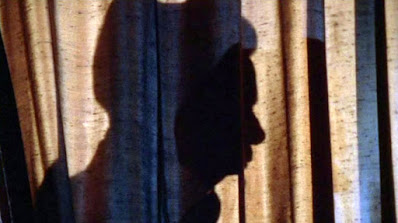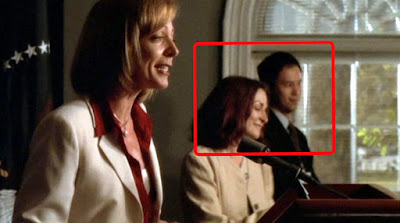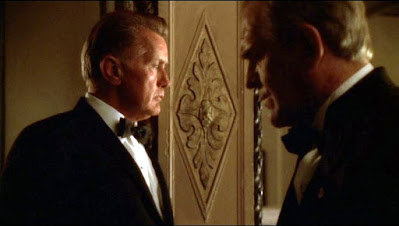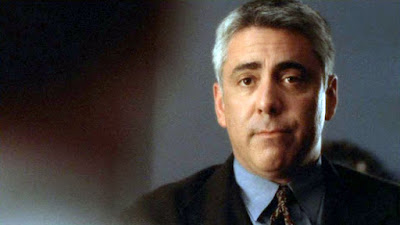Original airdate: September 25, 2002
Written by: Aaron Sorkin (66)
Directed by: Christopher Misiano (9)
Synopsis
- When Josh, Toby, and Donna are left behind by the motorcade at an Indiana campaign stop, they begin a journey through the heartland of America to get to back to DC. Months after Defense Minister Shareef's disappearance in a supposed plane crash, Qumar's reopening of their investigation into the incident gives Leo pause. Sam steps in to staff the President in Josh's absence, and realizes he has a taste for it. An offhand remark by Abbey stirs a backlash from conservatives. Bartlet continues to interview candidates for the executive secretary position.
"They just change their watches every time they cross a time zone? What is this, a joke?"
The story of average, everyday Americans living in the heartland being able to touch the lives and change the minds of elitist, urban, citified people is a longstanding trope in drama. I mean, really longstanding. Aaron Sorkin goes to that well to kick off Season 4, stranding Josh, Toby, and Donna in the middle of Indiana so they can get their comeuppance from the "common people" and learn something important in the process.
Okay, so that sounds a bit sneery and sarcastic when I put it that way. This episode actually is a well-loved one by many West Wing fans, because we like seeing city slickers Josh and Toby completely out of their element in rural America. And also dragged by some high schoolers:
Sam: "You got left behind by the motorcade?"
Josh: "Yeah, and then we ran out of gas, and there was a time zone foul-up, and also, we were waylaid by some mean schoolgirls. Alpha girls, you know what I'm saying?"
There are a lot of moving parts to this episode, and several of them that won't really come into play until Part Two. We hear of Abbey's campaign stop in Madison, Wisconsin, where she faced protests from women who didn't appreciate her comment about being "just a wife and mother":
Mark (reporter): "CJ, do you have any idea why there were women at the First Lady's rally this morning who were dressed in ... (checks notes) ... aprons and rolling pins?"
CJ: "They were dressed in rolling pins?"
The Dow is in free fall, and the administration is casting about for ways to stabilize the markets. CJ is trying to find a new Big Brother for Anthony Marcus, whom Simon was mentoring before he was shot. There's a guy waiting for a photo op who has shaken hands with every President since Herbert Hoover. And the President uses the flight back to DC from Indiana to interview a couple of candidates for his secretary position, to replace Mrs. Landingham. The interviews don't really go all that well ... you can see Jed really isn't making a connection with either of these extremely serious, almost gruff women.
There's also mention of Qumar, which brings to mind what we, the viewers know from last season: that President Bartlet had the country's Defense Minister, Abdul Shareef, killed on a lonely Bermuda airstrip in retaliation for terrorist attacks against Americans. It was reported as his plane going down in the Atlantic, but when an adviser notes Qumar is reopening the investigation into Shareef's disappearance, Leo and Admiral Fitzwallis share a meaningful look:
All these storylines are just waiting for future episodes to provide context, depth, and (eventually) resolution.
But the heart of this episode remains back in Indiana, with our three denizens of the big city high-falutin' political world stuck in the Midwest. The story begins at a campaign rally at an Indiana farm, where Bartlet touts alternative energy and connects his opponents to Big Oil.
Josh and Toby are off in a soybean field with Cathy, the daughter of the farmer who owns the land. Toby is agonizing over how the speech is being delivered, how it lands with the crowd, while Josh dismisses Cathy's urging to increase aid to struggling small farmers like themselves. As the speech wraps up, Donna tracks them down so they can hop in the motorcade and continue to the next stop. Except as they come around a row of buses ...
Josh: "Hey, excuse me. Where's the motorcade?"
Woman (pointing): "It's out there."
And our journey begins, 110 miles from the nearest taxicab, stranded in Indiana.
Cathy offers to help - her boyfriend can let them use his soy-diesel pickup to get to the next campaign site. So all the guys load into the back of the truck:
If you're starting to be reminded of the 1987 Steve Martin/John Candy classic Planes, Trains, and Automobiles, I don't think it's an unintended connection. When the truck runs out of fuel, our intrepid trio must walk to a nearby service station to call for a ride. Josh and Toby, at odds with each other over something, have a tense game of tossing rocks at a barrel with the loser required to add "I work at the White House" to their name for the rest of the day.
Toby loses.
Once they get their ride, their simmering disagreement boils over. Josh isn't happy with the changes in the campaign strategy, changes that Toby and the President have apparently made without coordinating with the rest of the staff. Toby is trying to make the election more of a personal match, a contrast between competence and affability, between intellect and ignorance, or as he said in Hartsfield's Landing, "between smart, and not." Josh is afraid this tactic is going to turn off voters in what looks like a very close election.
Their argument is interrupted when their young driver sees some friends of his along the road and decides he needs to take care of a personal matter.
Josh: "When did we decide to make this about being the smartest person in the class? What meeting did I miss?"
Tyler: "I have to pull over for a minute."
Toby (to Josh, intently): "Let me tell you something ... (beat) What did he say?"
As Tyler begs his case with Kiki, Josh, Toby, and Donna are desperate to get to Air Force One before it departs. Except ... this is Indiana, where time is complex and confusing.
Josh: "Tyler, no fooling around. We've got 15 minutes to get to a plane that is three miles from here. That plane, I swear to God, is taking off at 1:00."
Tyler: "It's taking off at 1:00?"
Josh: "Yes, it is."
Kiki: "Are you guys stupid or something? It's 1:45 right now."
Josh: "It's 12:45."
Kiki: "No, not here, it's not."
Donna: "Oh, my God, she's right."
Tyler: "See, we crossed over from Unionville to Dearborn County which doesn't observe Daylight Saving Time."
Kiki: "I think it's the other way around, genius."
Air Force One is already long gone. Josh and Toby do not take this news well.
So they're really stuck, and as they scramble for another way back home they'll encounter even more denizens of the heartland.
Meanwhile, there's Sam. Ordered to go home and sleep after being up for nearly three days straight, he's awakened by a frantic phone call from Josh. Since the Deputy Chief of Staff is stuck in Indiana with no quick way home, and the President has a full slate in the Oval Office, Josh needs Sam to step in and staff Bartlet.
Sam: "I don't know what it is you do in there."
Josh: "Yeah, you do. Anything ceremonial, security related, or personal, you leave the room. As it gets later in the day he's going to start to talk to you. You're going to tell him how the meeting he just had with his Council of Economic Advisers relates to the meeting he had with the Agriculture Secretary, relates to his intelligence briefing, relates to the environment, relates to jobs, relates to education, relates to the campaign. You're his wide-angle lens."
Sam: "There are going to be any number of areas on which I can't give him expert advice."
Josh: "Welcome to the club, partner. We got jackets."
So a dead-tired Sam steps in to stand by President Bartlet. Unsure of his bearings, he asks the President if there's a place he should be, getting the answer, "Just rock and roll, Sam." Thankfully Larry is there to point him right:
 |
| "Josh likes to stand over there." |
Instantly, in a meeting with the Secretary of Commerce, Sam does what he thinks he's supposed to do - he jumps in to take the blame for an energy speech that has Secretary Bryce riled up. Bartlet cuts Sam off, firmly telling Bryce he's wrong and he needs to get on board with the White House.
Sam takes note. This is how political power is used, how the levers of government come into play. It's not just about speeches and communication and how you say things - it's about personalities and drive and embodying the will of the voters who put you there. When a freshman Congressman from Texas stops by to get a photo with the President, Sam is even more intrigued - the easy familiarity Jed has, the way he connects this elected official from a Vietnamese refugee family to Leo, who flew fighter missions in the Vietnam War:
Sam feels something he's been missing in his job. The seed is planted, and Mr. Seaborn is going to start steering his career in a different direction over the next half of the season.
There is indeed a lot packed into this 43-some minutes, with no payoffs for us yet. Those must wait for Part Two, or even later episodes further down the line. As long as we have some dry rub to take along with us, we can manage the time.
Tales Of Interest!
- Another two-part season opener, just like Seasons 2 and 3. It was originally aired as a two-hour special episode, then divided into two parts for reruns and syndication.
- Let's address the elephant in the room in Season 4: Rob Lowe's upcoming departure from the series. If you've been reading this blog for a while, you know the original idea for The West Wing was to follow the staffers in the White House and see how things worked behind the scenes, with the President just an occasional figure that would pop up every month or so. Lowe (and Moira Kelly, in the beginning, but that's another story) was seen as the "star" of the series, given the top billing in the credits and a salary of $75,000 an episode, over twice as much as the rest of the regulars received.
But then we got Martin Sheen cast as Jed Bartlet, and his onscreen presence and undeniable strength as a performer forced the President into more of a starring role. Meanwhile, Sorkin started having trouble finding good stories to write for Sam Seaborn, as the character was left to deal with plotlines wholly separated from the rest of the cast: the elimination of the penny (War Crimes); the OMB definition of poverty (The Indians In The Lobby); seatbelt laws (The Women Of Qumar). Add to that the fact that Allison Janney, Richard Schiff, John Spencer, and Bradley Whitford walked off the set together the previous summer (after Season 2) to demand more money (and got a doubling of their salaries, to $70,000 per episode), and that Sheen saw his salary jump to $300,000 an episode for Season 4, well ... with Lowe looking at a serious lack of good stories for Sam as well as being the only cast member not getting a raise, it's not really all that surprising he decided to walk away from the show.
Right from episode one, you see Sorkin starting to lay the groundwork for Sam's departure, by giving him a taste of being "on the inside" with more access and responsibility than he has as Deputy White House Communications Director. And Sam likes it!
- A new season brings us a slightly revised credit sequence. Everybody stays in the same order - Lowe comes first, the rest of the cast in alphabetical order, with "and Martin Sheen" bringing up the rear - but there's some new video added for Lowe and John Spencer, and maybe for Janel Moloney as well. Stockard Channing will again appear in the credits in episodes she's in.
- Western Pennsylvania was used to stand in for the farmland of Indiana, specifically areas in Lawrence County in and around the town of Volant. That's just about 50 miles north of Pittsburgh.
- The Daylight Saving Time mixup truly was a fact of life in Indiana at the time of this episode, and the issues of time confusion in different parts of the state merits its own Wikipedia page. Indiana is mostly in the Eastern time zone, with some counties in the northwest (part of the Chicago-Gary metro area) and southwest choosing to be in the Central time zone. In 1972 Congress gave states with multiple time zones the power to allow one of those sections to not participate in Daylight Savings Time. In Indiana, the sections in the Central time zone did follow DST, turning their clocks ahead an hour in the spring and back in the fall, but the majority of the state (in the Eastern time zone) did not, remaining on Standard Time year-round. That meant the entire state was actually on the same clock during the summer months, with the northwest and southwest areas an hour off from the majority of the state in the winter.
Not following DST, though, made things complicated for cities and towns along the border with other states, which continued to change their clocks twice a year. Some counties in the southeastern corner of Indiana, near Cincinnati, Ohio and Louisville, Kentucky, chose to informally follow DST to align their clocks with the major metropolitan areas across the state lines. Dearborn County was one of those counties:
Tyler: "See, we crossed over from Unionville to Dearborn County which doesn't observe Daylight Saving Time."
Kiki: "I think it's the other way around, genius." (She's right, he's wrong, Dearborn County did observe DST)
So while our merry band of misfit wanderers that missed the motorcade was operating on Eastern Standard Time, the local time in Dearborn County was Eastern Daylight Time, or an hour ahead of what Toby, Josh, and Donna thought it was.
Since 2007 the entire state, while still divided between the Eastern and Central time zones, observes Daylight Saving Time.
- Sorkin's specificity about the Indiana locations only raises confusion for us, though:
- The only Unionville in Indiana is a small unincorporated town near Bloomington. It's certainly not the location of a Naval Warfare Center (not to mention it's 200 miles from Lake Michigan, the nearest large body of water).
- Unionville is also about 100 miles west of Dearborn county, so there's not really an instantaneous time-zone-dividing line between one and the other.
- Dearborn county's largest town has about 5000 residents, and there's no large airport such as "Reynolds Air Force Base." It is right across the state line from Cincinnati, which would have airports that could accommodate Air Force One - but if the official schedule was using Cincinnati EDT for local time, instead of Indiana EST, there would never have been any confusion for Donna, Josh, and Toby about when the departure time was.
- Josh mentions Tyler is taking them to the "Connersville metro station" to catch a train to get to Indianapolis. Connersville is a town of about 13,000 people, two counties to the northwest of Dearborn county. Again, Dearborn county is almost to Cincinnati, it makes no travel sense to try to get to Indianapolis from there instead.
- Pretty fancy security to get into the Situation Room, as Leo gets his hand scanned in order to enter (note how far this set has come since the days of A Proportional Response, or "Post Hoc, Ergo Propter Hoc" when they didn't even have a Situation Room set):
- Kind of a neat shot as President Bartlet walks away after his speech at the military base, having just heard the news from Leo that Qumar is nosing around Shareef's disappearance again. The shot of the President under the huge American flag in the hangar, given the circumstances, is nicely timed and well composed.
- It's tough to make out, but Gail's fishbowl has a large directional sign pointing the way to Washington DC. If only Josh, Toby, and Donna had Gail along with them to guide the way ...
- Bruno says, "Election's in six weeks, Mr. President." With Election Day of 2002 being November 5, that would mean the end of September or the first week of October. This episode aired September 25, so pretty close.
Quotes
CJ: "Where are Josh and Toby?"
Donna: "They're in the soybean fields, talking to Cathy."
CJ: "Cathy?"
Donna: "The daughter, but I like saying Toby and Josh are in the soybean fields."
CJ: "He's wrapping up, and we're getting right in the car. We're already late for Unionville."
Donna: "I'll get them from the soybean fields."
-----
Josh: "Donna's a little nervous. A couple of weeks ago, some guys got left behind by the motorcade in Kentucky."
Donna: "It was Tennessee, and they were never heard from again."
-----
Cathy: "We've got some voters here, Josh, did you forget?"
Josh: "No."
Toby: "They're voting for Ritchie."
Cathy: "What?"
Toby: "Indiana's voting for Ritchie. If there was someone less competent than Ritchie on the ballot, that's who Indiana'd be voting for."
-----
Leo: "What's his first?"
Margaret: "Treasurer of the United States, not to be confused with Treasury Secretary."
Leo: "The Treasurer of the United States deals with the color of money. What's the meeting about?"
(Margaret digs through the files she's carrying)
Margaret: "Color currency."
-----
Leo: "Just out of curiosity, what do you think would happen?"
Fitzwallis: "I don't know what would happen to you and me but I'm pretty sure the President would be invited to see the inside of The Hague."
Leo: "Yeah, well, they can invite all they want. He ain't going."
Fitzwallis: "Perhaps this would be a good time for you to reconsider your position on an international war crimes tribunal."
Leo: "Perhaps this would be a good time for you to -"
Fitzwallis: "Get out of your office?"
-----
(Josh and Toby are flipping out over the time mistake)
Donna (to Tyler): "Okay, this is a whole new thing now. My boys are going to need to walk this off a bit before they can regroup. Kiki, you and your friends get back to school. Tyler, you and I are going to come up with a plan to get us to a commercial airport."
Tyler: "Okay, how long are they going to be?"
Donna: "A couple more minutes."
-----
Fiona: "What would you like?"
Toby: "What's good?"
Fiona: "Everything."
Toby: "What's your specialty?"
Fiona: "Taking someone's order and giving it to them."
Toby: "Okay."
Fiona: "I saw you drive up. You people going to cause trouble."
Toby: "I swear not on purpose."
Story threads, callbacks, and familiar faces (Hey, it's that guy!)
- Amy Adams (Arrival, American Hustle, Julie & Julia) plays Cathy, daughter of the farm family hosting the President's campaign speech. Adams had a few roles prior to this episode, mostly in TV with a few movie appearances, but was largely unknown. Catch Me If You Can, where she costarred with Leonardo DiCaprio, didn't come out until three months after this episode aired. Her breakout performance in Junebug was three years away, and the huge hit Enchanted was still five years in the future.
- Tyler, the high-school student who tries to help out Josh, Toby, and Donna in his jeep, is played by John Gallagher Jr. (10 Cloverfield Lane, Westworld). He may not be quite a household name, but he returned as a member of the Mighty Sorkin Players with a lead role in Sorkin's 2012 HBO series The Newsroom.
- There's a familiar face in the Situation Room: Peter, the adviser updating Leo on Africa, has appeared several other times (most notably in 18th And Potomac and the opening episodes of Season 3 as the adviser on Haiti). He's played by Victor McKay (whose character was apparently billed as "Henry" in Manchester Part I but "Peter" in Manchester Part II and all his other appearances).
- Nancy (Renee Estevez, Martin Sheen's daughter) gets a little attention at the speech at the Naval Warfare Center, first seen on stage talking on the phone as the speech wraps up and then giving the phone to Charlie (who calls CJ over, so she can get the President's attention to come talk to Leo - seems like a lot of unnecessary steps).
- The Situation Room discussion about Qumar reopening their investigation into the "plane crash" that killed Defense Minister Shareef continues the assassination storyline from Posse Comitatus.
- During a campaign speech, President Bartlet mentions making an appointment to the Supreme Court. That, of course, was Justice Mendoza, with the nomination/confirmation playing out in The Short List and Six Meetings Before Lunch.
- Fitz says Leo should rethink his opinion on an international war crimes tribunal. We saw Leo's position in favor of such a tribunal in War Crimes.
- We get just a quick shot of CJ gathering her thoughts before she talks to Charlie. This moment of somber reflection shows her sorrow over Simon Donovan, their budding romance cut down by an armed robber in Posse Comitatus.
- One of Charlie's reasons for not becoming a Big Brother is that he just got Deanna off to school. We discovered in Charlie's first episode (A Proportional Response) that Deanna is Charlie's little sister, and he's been her caretaker since their police officer mother was killed in 1999.
- We know Sam's undergraduate work was done at Princeton, most recently mentioned in The U.S. Poet Laureate when he tells CJ his Princeton Tigers could whip her Cal Bears at logarithms. He's wearing a Princeton t-shirt when Josh wakes him up with a phone call.
- The ongoing comical confusion between Ed and Larry continues (and the two get quite a bit of screen time in this episode):
President (to Larry): "Ed ..."
Larry: "Well, I'm Larry, sir."
President: "Whatever."
- WHAT'S NEXT MOMENT - At the end of the episode, after Congressman Lien leaves the Oval Office, the President smiles, turns to Larry and Leo, and says, "What's next?"
DC location shots
- None, but there are plenty of shots of the Pennsylvania countryside (standing in for Indiana).
They Do Exist! It's The Real Person, or Thing
- A New Holland combine is seen clearly behind President Bartlet at his farmstead speech.
- Leo grumps about fitness guru Jack LaLanne when he asks for a Margaret-approved half a grapefruit.
- The sailors sing The Battle Hymn Of The Republic at the Naval Warfare Center.
- The discussion between Leo and Fitz over the Bermuda Triangle includes references to "Toscanini landing in a cornfield" (which is apparently a Sorkin-invented phrase) and the disappearance of five Navy Avenger bombers and the rescue plane sent after them.
- Josh's exclamation "Danger, Will Robinson" when the high-school girls bring up abortion is from the television show Lost In Space.
- Bruno mentions a list of polls sponsored by actual media firms, including ABC/Washington Post, CBS/New York Times, NBC/Wall Street Journal, and CNN/USA Today, and the Gallup polling company. He also brings up right-wing conservative activists Phyllis Schlafly and Ann Coulter.
- Discussing Mondays, Donna refers to the Boomtown Rats' song I Don't Like Mondays and the school shooting that inspired Bob Geldof to write it.
- As Josh criticizes Toby's campaign tactics, he says Ritchie's advisers include the economist Milton Friedman. Leonard Tynan, the education adviser, is apparently fictional.
- There's a throwaway line about a photo op with someone who's shaken hands with every President since Herbert Hoover. More about that in the next episode.
- Sam asks Ginger about a Reader's Digest -style condensed index to get him up to speed:
Sam: "All right, do we have some sort of condensed Reader's Digest index of ... well, all human knowledge?"
Ginger: "We usually just use Margaret."
End credits freeze frame: Sam in the Oval Office, getting a taste of the real benefits of inside politics.





